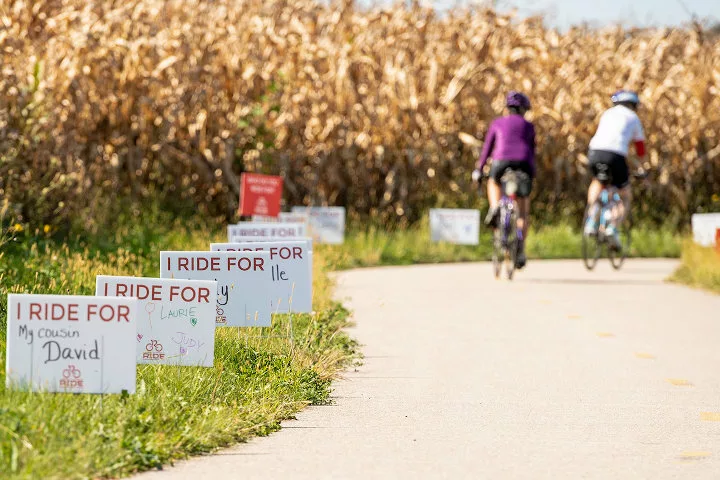Christopher ‘Rufus’ Sweeney Thinks Outside the Box in His Training and Career
Sweeney, known as a creative soul and prolific idea generator, says he inherited his entrepreneurial spirit from his paternal grandfather.
Federal grants are the largest source of funding for cancer research, but intense competition for limited funds means that not all high-quality, high-impact projects make the cut. Investigators can increase their chances by demonstrating project feasibility with preliminary data from pilot studies. But proof-of-concept projects also are expensive. Where does the money come from?
Increasingly, the answer to this question for cancer researchers at the University of Wisconsin School of Medicine and Public Health (SMPH) is The Ride, a benefit for cancer research. Rolled out in 2016, this popular and growing annual event has already raised over $1.3 million for innovative cancer research and treatment.
“We created The Ride as a fun and inspiring way to get the community involved in funding promising cancer research. And we’ve gotten a great response,” says Deric Wheeler, PhD ’04, associate professor, Department of Human Oncology, and co-founder and director of the event.
“The Ride empowers people to be part of a community effort to help drive the UW research engine and enable our researchers to work toward making cancer treatments more effective,” he notes.

In 2020, The Ride modified the event to ensure the health and safety of participants during the COVID-19 pandemic. There was no central gathering or set time to ride the course. Participants had the option to ride one of the routes at their leisure or take part in the new Global Program, which enables riders to participate from anywhere around the world. The Ride attracted more than 850 registrants in 2020, a remarkable accomplishment in a year when many events had to cancel completely, says Wheeler.
“We knew it was critical to deliver a safe environment for those participating on-course in 2020, and we wanted to expand the reach of The Ride to allow people worldwide the ability to impact the UW–Madison cancer mission,” he explains. “The new Global Program provides individuals the ability to partake in the annual event remotely from their hometown by completing one of the many distance routes while advancing The Ride’s mission of accelerating cancer research and patient treatment programs.”
The motto of The Ride from the beginning has been “Raised Here. Stays Here.” All dollars generated by The Ride go toward funding innovative cancer research projects and programs. The Ride Scholarship program competitively funds projects that emphasize translating discoveries made in the lab to the clinic with the goal of improving cancer treatment.
“The Ride Scholarships provide opportunities for researchers to apply their creativity to complex questions and advance their work so they can compete for funding from other sources, such as the National Cancer Institute,” Wheeler says. “This program funds excellent projects that might have been shelved if not for the commitment and generosity of The Ride’s participants, donors, volunteers and sponsors.”
So far, The Ride Scholarship program has awarded over $1.3 million to more than 40 projects and programs encompassing a wide range of cancer research subspecialties, including genomics, imaging, immune oncology, population health, precision medicine, radiation therapy, targeted therapies and viral oncology.
“We knew that awarding seed grants from The Ride would be a powerful mechanism to ignite researchers’ best ideas and help them gain early traction,” notes Paul Harari, MD, chair of the Department of Human Oncology and co-founder of The Ride. “We have seen a whole cadre of Ride Scholars gain a foothold in attaining federal funding support with stimulus from The Ride.”
In 2017, Joshua Lang, MD, MSc ’17 (PG ’08, ’11), associate professor, Department of Medicine, earned a $25,000 Ride Scholarship for a pilot project to develop new biomarkers of epigenetic alterations in prostate cancer with the goal of developing new approaches for cancers that have become resistant to therapy. With this seed money, he was able to successfully compete for a multi-million-dollar R01 grant from the National Cancer Institute to advance this important research.
Zachary Morris, MD, PhD (PG ’16), assistant professor, Department of Human Oncology, was a 2016 Ride Scholar. The award enabled him to pursue highly innovative research ideas to generate supporting data that helped secure more than $8 million in federal funding for his laboratory program over the subsequent four years, exploring the combined use of radiation and immunotherapy to treat cancer.
“That funding is the direct result of early seed money provided by The Ride,” shares Morris. “In addition, the results we generated from our research have brought two novel clinical trials to the University of Wisconsin. This is directly impacting the care available to cancer patients.”
He notes, “The Ride has a very special place in my heart. We rode the very first Ride as a family. Later that year, my dad was diagnosed with a brain tumor. The second year, my dad and I rode a tandem bike because he was no longer able to pedal. My dad passed away the following year, and we rode in his absence. The Ride is one of those important landmarks in my life and that of my family. It reminds us we’re all in this together. Participating in The Ride and supporting this cause is a great way to help the University of Wisconsin’s cancer research and, ultimately, cancer patients.”
Reflecting on sentiments such as those shared by Morris, Harari says, “The Ride is a remarkably inspirational event. Bringing cancer patients and their families together with health care providers and community supporters is a very powerful formula.”
Organizers are planning several exciting changes for the next version of The Ride, which will take place on September 26, 2021. The ever-growing event will occur at the American Family Insurance headquarters in Madison. In addition to five cycling routes (100 mile, 100K, 50K, 25K and 5K), The Ride 2021 will include a 5K run/walk and a 13.1 mile half-marathon.